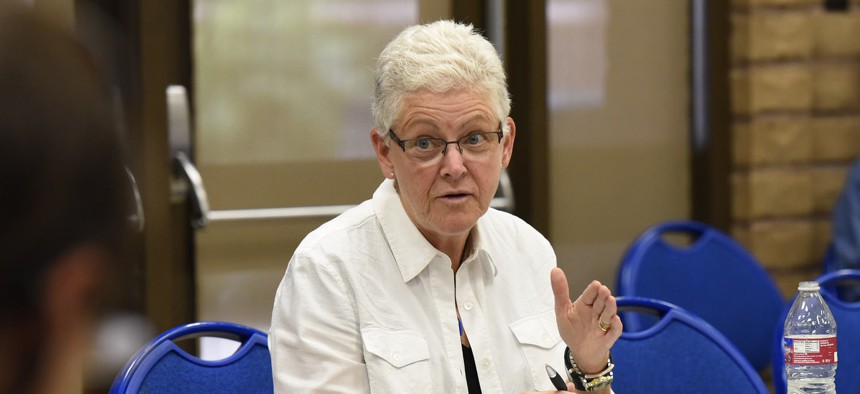
MccArthy speaks in Colorado about the Animas River spill in August. EPA
EPA's Gina McCarthy’s Harsh Words for Keystone XL
Comments made public Friday reveal her to be more critical than other Cabinet-level officials.
Publicly, EPA Administrator Gina McCarthy played her cards close to the vest on the Keystone XL oil-sands pipeline, offering largely noncommittal remarks when asked about Keystone during the long State Department review.
But a letter made public Friday alongside President Obama’srejection of the project shows McCarthy taking a harder line, even if she stops just short of overtly recommending that the Obama administration block the pipeline from being built.
In the Feb. 2 letter, McCarthy told the State Department that approving Keystone risked undermining Obama’s work on climate change.
“The climate impacts of the decision—both the investment it represents in a high carbon intensity energy source and the potential that the pipeline could result in large increases in greenhouse gas emissions—and the message that approving it would send at a critical moment for international action on climate change, are at the heart of this country’s national interest,” she told Secretary of State John Kerry.
The letter is part of the interagency comments posted publicly online Friday that various departments provided to the State Department early this year to State’s decision-making on Keystone.
The EPA letter is sympathetic to a central argument that environmentalists made against Keystone. Green groups long argued that Keystone would boost greenhouse-gas emissions by enabling a substantially bigger growth in production of carbon-intensive Canadian oil sands.
“Given the potential impediments to oil sands growth that sustained lower oil price and constrained pipeline scenarios could present, the decision to permit the Keystone XL pipeline could increase oil sands development over what would otherwise occur, and thereby result in significant increases in greenhouse gas emissions,” McCarthy wrote.
The State Department didn’t quite accept that logic in its final decision against the pipeline, but noted uncertainties about the question en route to concluding that building Keystone is a bad idea.
From the final written decision: “While the proposed Project by itself is unlikely to significantly impact the level of GHG-intensive extraction of oil sands crude or the continued demand for heavy crude oil at refineries in the United States, it is critical for the United States to prioritize actions that are not perceived as enabling further GHG emissions globally. Irrespective of the uncertainty highlighted above, an approval of the proposed Project would facilitate transportation into our country of a highly carbon intensive energy source.”
McCarthy’s letter is tougher on Keystone than her public comments (like these) while the State Department and the White House were still weighing the project.
But it’s not the only example of EPA seeking to influence the project. In a separate early February letter about State’s environmental analysis that was made public at the time, EPA urged State to revisit its largely benign analysis of the greenhouse-gas impacts of building Keystone in light of the collapse in oil prices.
EPA is among the seven Cabinet-level agencies that provided the State Department with comments about whether permitting Keystone XL would be in the country’s “national interest.”
Other federal agencies’ comments were less pointed, although the Interior Department provided State with letters of opposition from a number of Native American tribes.
The Energy Department offered detailed information and analyses of oil markets, the impact of crude-oil-price reductions on the oil-sands sector, and more, but does not make any recommendations.
The Commerce Department was very brief, noting only, “The Department of Commerce has no comments/views.” The Defense Department said it would have “no objection” to a permit for TransCanada, and so did the Homeland Security Department.
NEXT STORY: Merging Common Purchases Makes Dollars and Sense







